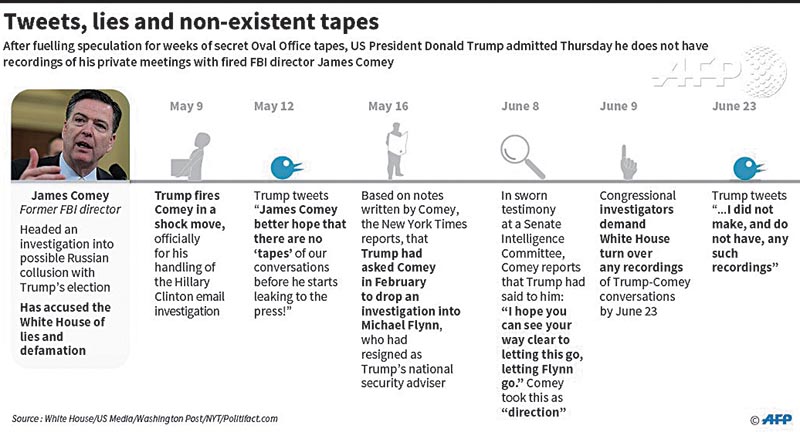Trump admits he has no recording of private meetings with Comey
US President Donald Trump admitted yesterday that he did not have recordings of his private meetings with fired FBI director James Comey, after fuelling speculation for weeks of secret Oval Office tapes.
But Trump’s belated admissions did little to quell allegations that he has sought to stifle investigations into possible collusion between his presidential campaign and Russian interference in last year’s election.
“With all of the recently reported electronic surveillance, intercepts, unmasking and illegal leaking of information, I have no idea whether there are ‘tapes’ or recordings of my conversations with James Comey, but I did not make, and do not have, any such recordings,” Trump said on Twitter.
The admission threw a new twist into allegations, fed by Comey’s own claims, that Trump wanted the Federal Bureau of Investigation to pull back on its probe into the Russia scandal.
Those accusations are believed to now be part of an independent Justice Department probe into possible illegal obstruction of the investigation by the president.
Trump’s tweet came after weeks of challenges to the White House to prove the assertion that he might have recordings of his conversations with the former FBI chief, whom he fired on May 9. Facing a slew of criticism for sacking the man investigating the Russia scandal, Trump warned Comey there could be retribution if he revealed anything of their private conversations.
“James Comey better hope that there are no ‘tapes’ of our conversations before he starts leaking to the press!” Trump tweeted on May 12.
That claim quickly raised concerns that Trump, like some US presidents in the past, was secretly recording all of his conversations in the White House.
And it took on more weight when Comey leaked out his own private memorandums of several discussions with Trump, in which he described the president as improperly pressuring him over the Russia probe.
In a June 8 hearing in Congress, Comey described several meetings with Trump and said he in fact hoped the tapes do exist, as they would support his account of their discussions.
“I’ve seen the tweet about tapes. Lordy, I hope there are tapes,” he told the Senate Intelligence Committee.
Democrats had demanded Trump come up with the tapes as they sought support for allegations of illegal obstruction.
Democrats sitting on the House Intelligence Committee that is investigating Russian interference in the election and possible Trump campaign collusion had threatened to issue a subpoena if the White House failed to turn over the supposed tapes of Comey discussions by June 23.
Trump for weeks fed speculation about the tapes, repeatedly fending off questions about them with quips that he will answer the question “sometime in the near future,” as he said on June 9.
White House deputy spokeswoman Sarah Huckabee Sanders parried reporters’ questions as to whether other officials had made secret recordings in the White House.
“The president’s statement today via Twitter is extremely clear,” she said.
Asked if Trump regrets the original tweet, she replied: “I don’t think so.”
But pressed on the reasoning behind that first message, Sanders replied: “I think it was more about raising the question of doubt in general.”
But with Trump’s new admission, Democrats were raising questions about why he wrote the original tweet directed at Comey, suggesting it was part of a pattern of obstruction.
“If the President had no tapes, why did he suggest otherwise?” asked Adam Schiff, senior Democrat in the House Intelligence Committee.
“Did he seek to mislead the public? Was he trying to intimidate or silence James Comey? And if so, did he take other steps to discourage potential witnesses from speaking out?”






